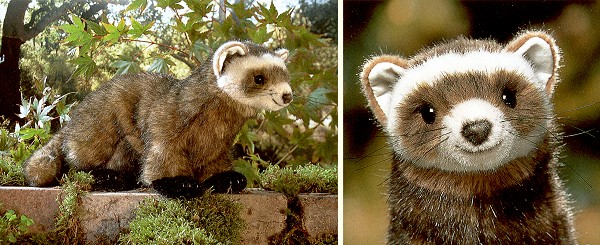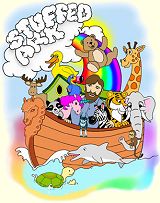 |
|
Stuffed Plush
Polecat
Traditional
craftsmanship, attention to detail, and a sense for what is important.
Handmade in Germany by Kosen using the finest materials. |
19 Inches Long
Nose To Tail
Kosen Plush Polecat
KS5140
$126.95
Sold Out
No Longer Available
6 Mar 18
|
|
For 100 years toys have
been produced in Bad Kösen, a small resort town on the Saale River in
Germany. Käthe Kruse founded the company in 1911/12 as a doll making
workshop. The first plush animals were presented at the Leipzig Trade
Fair in 1958.
Kösen plush animals are distinguished by highly naturalistic and
expressive design, by their immediate appeal as toys and by their
quality of material and craftsmanship. Each design is based in intensive
studies of the anatomy and movement of the animal depicted. Kösen
designers draw the animals in their natural habitats or in zoos and
create them as three dimensional models from clay. The toy animals are
always presented in the typical and natural position. |
Important details are
lovingly executed, and especially the faces receive a very lifelike
expression. In order to achieve this, Kösen uses varied materials
including only the best quality plush fur. The animals are assembled
from up to seventy individual elements, sewn together, turned inside
out, filled with high quality fibres, stitched closed, combed and
brushed, embroidered and painted - all by hand and exclusively at Bad
Kösen. Kösen plush
animals are made in Germany with materials from Europe. All meet
European safety norms and carry the CE mark. All animals can be surface
washed at 30°C. A cuddly toy animal from Kösen is a valuable present for
children and for adults who love nature and wildlife.
See more of our Kosen Plush . . . |
|
|
Polecat -
any of several weasellike carnivores of the family Mustelidae (which
includes the weasel, mink, otter, and others). The pelt, especially of
the European polecat, is called fitch in the fur trade.
Principally terrestrial, the
polecat hunts at night, feeding
on small mammals and birds. It also eats snakes, lizards, frogs, fishes,
and eggs. The polecat is more
powerful than the marten but less active, and it rarely climbs trees.
Its litters of three to eight young are born in the spring after about
two months' gestation. The domestic, albino variety of the European
polecat is known as the ferret.
"polecat."
2006. Encyclopædia Britannica |
|

